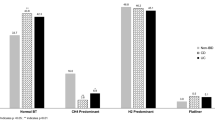Abstract
Background
Antibiotics for presumed small intestinal bacterial overgrowth have been shown to improve irritable bowel syndrome symptoms in at least 40 % of subjects. A lactulose breath test for small intestinal bacterial overgrowth has been used to select patients who will respond. However, its predictive value, using the classic definition of a positive lactulose breath test, has been disappointing.
Aims
We conducted a retrospective evaluation to study characteristics of the lactulose breath test that may be predictive of a response to antibiotics in patients with the irritable bowel syndrome.
Methods
A clinical practice database was interrogated for consecutive patients who had a lactulose breath test for irritable bowel syndrome symptoms and a subsequent antibiotic course. Hydrogen + methane levels with carbon dioxide correction were plotted against time. Various profiles of the breath test curves were catalogued and compared with respect to their predictive value for symptom response to antibiotics.
Results
Lactulose breath test graphs of 561 patients of all irritable bowel syndrome subtypes were grouped into categories based on their hydrogen + methane levels with respect to time. Of subjects whose hydrogen + methane rise was <20 ppm throughout the test (group 1; N = 95), 94.7 % improved after antibiotics (95 % CI 90.1–99.3). Of those with a rise <20 ppm within the first 90 min but a rise >50 ppm thereafter (group 3; N = 53), 47.2 % improved (95 % CI 33.7–60.6). The difference between groups 1 and 3 was statistically significant P < 0.001.
Conclusion
A lactulose breath test appears to be useful in predicting response to antibiotics in patients with the irritable bowel syndrome. A hydrogen + methane rise <20 ppm throughout the duration of the test is most predictive. This observation contradicts the classic definition of a positive lactulose breath test.



Similar content being viewed by others
References
Pimentel M, Lembo A, Chey WD, et al. Rifaximin therapy for patients with irritable bowel syndrome without constipation. N Engl J Med. 2011;364:22–32.
Hwang L, Low K, Khoshini R, et al. Evaluating breath methane as a diagnostic test for constipation-predominant IBS. Dig Dis Sci. 2010;55:309–403.
Pimentel M. Review of rifaximin as treatment for SIBO and IBS. Expert Opin Investig Drugs. 2009;18:349–358.
Kassinen A, Krogius-Kurikka L, Makivuokko H, et al. The fecal microbiota of irritable bowel syndrome patients differs significantly from that of healthy subjects. Gastroenterology. 2007;133:24–33.
Posserud I, Stotzer P, Bjornsson E, Abrahamsson H, Simren M. Small intestinal bacterial overgrowth in patients with irritable bowel syndrome. Gut. 2007;56:802–808.
Canavan C, West J, Card T. The epidemiology of irritable bowel syndrome. Clin Epidemiol. 2014;6:71.
Rana SV. Comparison of lactulose and glucose breath test for diagnosis of small intestinal bacterial overgrowth in patients with irritable bowel syndrome. Digestion. 2012;85:243–247.
Yu D, Cheeseman F, Vanner S. Combined oro-cecal scintigraphy and lactulose hydrogen breath testing demonstrate that breath testing detects oro-cecal transit, not small intestinal bacterial overgrowth in patients with IBS. Gut. 2010;60:334–340.
Bratten JR, Spanier J, Jones MP. Lactulose breath testing does not discriminate patients with irritable bowel syndrome from healthy controls. Am J Gastroenterol. 2008;103:958–963.
Walters B, Vanner SJ. Detection of bacterial overgrowth in IBS using lactulose H2 breath test: comparison with 14C-D-xylose and healthy controls. Am J Gastroenterol. 2005;100:1566–1570.
Vanner S. The lactulose breath test for diagnosing SIBO in IBS patients: another nail in the coffin. Am J Gastroenterol. 2008;103:964–965.
Husebye E. The pathogenesis of gastrointestinal bacterial overgrowth. Chemotherapy. 2005;51:1–22.
Quigley, EMM. Small intestinal bacterial overgrowth: what it is and what it is not. Curr Opin Gastroenterol. 2014;30:141–146.
Saad RJ, Chey WD. Breath testing for small intestinal bacterial overgrowth: maximizing test accuracy. Clin Gastroenterol Hepatol. 2014;12:1964–1972.
Lee KJ, Tack J. Altered intestinal microbiota in irritable bowel syndrome. Neurogastroenterol Motil. 2010;22:493–498.
Tack Jan. Antibiotic therapy for the irritable bowel syndrome. N Engl J Med. 2011;364:81–82.
Seyderhelm Richard. Die pathogenese der perniziösen anämie. Berlin Heidelberg: Springer; 1922.
Löwenberg W. Über die Pathologische Bakterienansiedlung im Duodenum und Ihre Ursächlichen Faktoren. J Mol Med. 1926;5:548–551.
Esposito I, de Leone A, Di Gregorio G, et al. Breath test for differential diagnosis between small intestinal bacterial overgrowth and irritable bowel disease: an observation on non-absorbable antibiotics. World J Gastroenterol. 2007;13:6016–6021.
Majewski M, McCallum RW. Results of small intestinal bacterial overgrowth testing in irritable bowel syndrome patients: clinical profiles and effects of antibiotic trial. Adv Med Sci. 2007;52:139–142.
Pimentel M, Chow EJ, Lin HC. Eradication of Small Intestinal Bacterial overgrowth Reduces Symptoms of irritable bowel syndrome. Am J Gastroenterol. 2000;95:3503–3506.
Frissora CL, Cash BD. Review article: the role of antibiotics vs. conventional pharmacotherapy in treating symptoms of irritable bowel syndrome. Aliment Pharmacol Ther. 2007;25:1271–1281.
Esposito I, de Leone A, Di Gregorio G, et al. Breath test for differential diagnosis between small intestinal bacterial overgrowth and irritable bowel disease: an observation on non-absorbable antibiotics. World J Gastroenterol. 2007;13:6016–6021.
Majewski M, McCallum RW. Results of small intestinal bacterial overgrowth testing in irritable bowel syndrome patients: clinical profiles and effects of antibiotic trial. Adv Med Sci. 2007;52:139–142.
Lauritano EC, Gabrielli M, Lupascu A, et al. Rifaximin dose-finding study for the treatment of small intestinal bacterial overgrowth. Aliment Pharmacol Ther. 2005;22:31–35.
Majewski M, Reddymasu SC, Sostarich S, Foran P, McCallum RW. Efficacy of rifaximin, a non-absorbed oral antibiotic, in the treatment of small intestinal bacterial overgrowth. Am J Med Sci. 2007;333:266–270.
Compliance with ethical standards
Conflict of interest
The study received no external funding and there are no conflicts of interest to declare.
Author information
Authors and Affiliations
Corresponding authors
Rights and permissions
About this article
Cite this article
Kasir, R., Zakko, S., Zakko, P. et al. Predicting a Response to Antibiotics in Patients with the Irritable Bowel Syndrome. Dig Dis Sci 61, 846–851 (2016). https://doi.org/10.1007/s10620-015-3872-9
Received:
Accepted:
Published:
Issue Date:
DOI: https://doi.org/10.1007/s10620-015-3872-9




